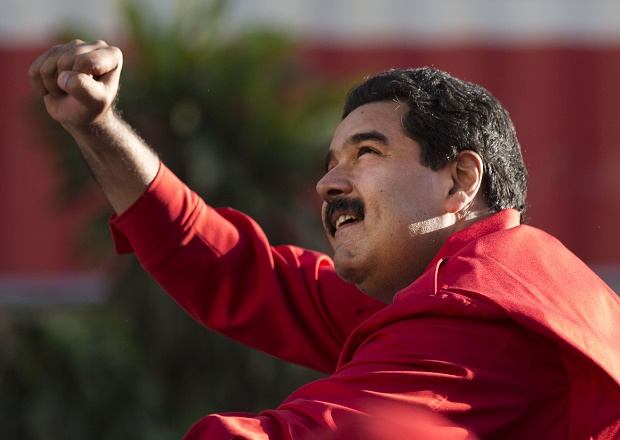Venezuela opposition sets out to oust government

Venezuela’s President Nicolas Maduro gestures to supporters from the top of a car after the inauguration of cable car public transportation system, in the popular neighborhood of Petare, in Caracas, Venezuela, Tuesday, Dec. 1, 2015. AP File Photo
CARACAS, Venezuela—Venezuela’s emboldened opposition laid claim Wednesday to a big legislative majority that could empower it to oust President Nicolas Maduro, who came out fighting and reacted by reshuffling his cabinet.
READ: Venezuela opposition takes congress, defies president
The lawmakers’ defiant move further deepened a tense political standoff in the South American oil-producing country, which is mired in recession and seen analysts warn of the possibility of unrest on the streets.
Leaders of the opposition, which has vowed to find a way to get rid of Maduro within six months, had portraits of the socialist government’s late hero Hugo Chavez removed from the National Assembly building.
READ: Venezuela opposition wins supermajority in National Assembly
Article continues after this advertisementThe opposition has taken control of the assembly for the first time since 1999, the year that Chavez came to power.
Article continues after this advertisementAt its first regular legislative session on Wednesday, the opposition-controlled assembly swore in three anti-government lawmakers, defying Maduro, who had secured a court injunction to suspend them.
The three extra deputies boost the total number of opposition seats in the legislature to a two-thirds “supermajority” that could enable them to remove Maduro by constitutional means.
The government side vowed to charge the opposition with contempt of court.
The number two in Maduro’s leadership, former assembly speaker Diosdado Cabello, said the swearing-in of the suspended deputies “flagrantly violated the constitution.”
Removing Chavez’s portrait
“I don’t want to see portraits of Chavez or Maduro. Take all this stuff away to the presidential palace, or give it to the cleaning staff,” the new speaker, Henry Ramos Allup, told workmen removing the portraits, in a video released by his staff.
He said his side would within six months propose a way “to change the government by constitutional means.”
Maduro responded: “I will be there to defend democracy with an iron hand. They will not make me give ground or waver.”
Facing a “new stage of the Revolution” and a “bourgeois legislature,” Maduro said his new cabinet team would work on the “grave economic situation” and retool his party’s policies.
In elections on December 6, the opposition MUD coalition won a majority in the assembly for the first time in nearly 17 years.
Under Venezuelan law, with a two-thirds majority, the opposition could from April launch measures to try to force Maduro from office before his term ends in 2019.
But it was not clear whether they will succeed in pushing ahead at odds with the court injunction.
The government side insisted any legislation passed with the votes of the suspended deputies would be null.
Cabello said the government would “paralyze” the assembly by withholding its budget from the treasury.
“No change of government is easy. Everything will depend on the situation in the country in a few months,” said Juan Manuel Rafalli, an expert in constitutional law.
“I foresee great social conflict and enormous pressure for change.”
‘US interference’
One of the first measures the opposition wants to pass is an amnesty for some 75 political prisoners, but Maduro has vowed to veto that move.
The US State Department backed the call for political prisoners to be released, with spokesman John Kirby calling Tuesday for a “transparent” resolution of the dispute.
Venezuelan Foreign Minister Delcy Rodriguez rejected that as “interference,” in a Twitter message.
December’s election result was widely seen as a protest by voters over the state of Venezuela’s economy.
It threw up the toughest challenge to the president’s authority and Chavez’s socialist “revolution” since Maduro took over from his late mentor in 2013.
Venezuela has the world’s biggest known oil reserves but has suffered from a fall in the price of the crude on which its government relies.
It is in deep recession, with citizens suffering shortages of basic goods and soaring inflation. Now they face the uncertainty of a political conflict.
“If the government uses its institutional control in a focused way, it could get its way in the short term,” said analyst Luis Vicente Leon, head of polling firm Datanalisis.
“While the Chavistas and the opposition get involved in a political debate, the people will feel a great lack of solutions to their main problems.”